People and Personalities of Barpeta District
People and Personalities of Barpeta District
- Nalini Bala Devi
- Pusparam Kahar (Talukdar)
- Umesh Chandra Dev Choudhury
- Rauta Ram Koch
- Narakanta Das
- Akshay Kumar Das
- Basanta Kumar Ojah
- Devendra Nath Uzair
- Ganesh Lal Chowdhury
- Janardan Das
- Dhaniram Talukder
- Mahendra Mohan Choudhury
- Ambikagiri Raichoudhury
- Chandraprabha Saikiani
- The Martyrs - Rauta Koch and Madan Barman
The big stories often make the headlines of our historical narratives, but history is not only about the landmark events - it finds shape and character in the myriad events that led up to a flashpoint of change. An attempt to discover and document stories of people, events, and places linked to the freedom struggle of India at the micro level of the district has led to the creation of a Digital District Repository. Stories in this section can be broadly classified under - People & Personalities.
Nalini Bala Devi
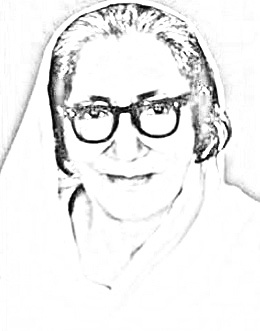 Nalini Bala Devi was born in 1898 in the Barpeta district of Assam to Hemanta Kumari Devi and Karmaveer Naveen Chandra Bordoloi. Her father was a renowned social worker, writer, and freedom fighter who was regarded as Assam's ‘Crownless Emperor.’ Nalini Devi grew up emulating her father’s qualities and became one of the most popular writers and poets of Assamese literature.
Nalini Bala Devi was born in 1898 in the Barpeta district of Assam to Hemanta Kumari Devi and Karmaveer Naveen Chandra Bordoloi. Her father was a renowned social worker, writer, and freedom fighter who was regarded as Assam's ‘Crownless Emperor.’ Nalini Devi grew up emulating her father’s qualities and became one of the most popular writers and poets of Assamese literature.
Nalini Bala Devi participated actively in the Non-Cooperation and the Swadeshi movement. She along with other freedom fighters in Assam established centres of khadi production to encourage usage of only indigenous goods. Her poems had emotional themes that centred on tragedy, patriotism, and devotion. She also released several books containing collections of her poetry. The most notable of these books were Sandhya Sur (1928), Parshmanu (1954), Yugdevta (1957), Jagruti (1960), Alaknanda (1967), and Antim Sur or the Last Tune. Along with poems, Nalini Devi also created well-known plays like The Last Praja (1958), Prahlad (1958), and Mirabai (1958).
Nalini Devi's life was filled with notable accomplishments and honours. She received the Padma Shri in 1957 and the Sahitya Akademi Award in 1968 for her poetry collection Alakananda. She is also the first woman to preside over the Assam Sahitya Sabha. Nalini Bala Devi passed away on 24th December 1977, leaving a priceless legacy in Assamese literature.
Pusparam Kahar (Talukdar)
Pusparam Kahar, a skilled bell metal artisan, was born in 1950 in Sarthebari, a historical hub of bell metal cottage units in the Kamrup district during British rule. Today, Sarthebari is a small township in the Barpeta district of Assam. Pusparam Kahar was highly proficient in the art of crafting beautiful bell metal utensils.
In the early 1890s, a revolt against the land tax imposed by the British Government gained momentum among farmers in Assam. Since Sarthebari was a low-lying and waterlogged area that was not suitable for cultivation, most of its residents were engaged as artisans and laborers in small bell metal manufacturing cottage units. However, the land tax was imposed on anyone who possessed the land, regardless of whether or not it was cultivable. The officials under the Mouzadar, the head of the Mouza revenue unit, were authorized to collect taxes, and they even targeted Satras, which were worship places with nam/kirtanghar structures made for community prayers, and the Satraadhikaar, who was responsible for administering the Satras. They began demanding extra fines or seizing properties if the tax was not paid on time. To oppose this exploitation, the locals organized meetings called Raijmel to unite everyone from one village to another. Pusparam Kahar was one of the foremost leaders of these Raijmels.
Haliram Mandal was severely attacked while collecting taxes in Bannarpar of Kapla Village on 21st January 1894. The Sub Division Officer of Barpeta was informed of the incident and asked to visit the temporary police camp in Panagaor Tup to take action against the Raijmels. However, the leaders received advanced information that the SDO would be visiting on 24th January 1894. In response, they mobilized over 6000 volunteers to gather in front of the Panagaor Tup police station on that day. When the SDO saw the large crowd, he did not dare to dismount from his horse. The leaders, led by Pusparam Talukdar, demanded that he address the people. When the SDO ignored their request, Pusparam Talukdar forcefully pulled him down from his horse. The SDO managed to escape with the help of the local Gaobuhra (Village Head). Following this incident, a massive search operation was launched to apprehend Pusparam Talukdar and about 200 volunteers were subjected to inhumane torture in the temporary jail of Panagaor Tup.
Pusparam Talukdar was sentenced to six years in jail. While he was in Silchar jail, he requested bell metal utensil manufacturing equipment, which the authorities provided. He used this equipment to create many beautiful items, some of which were even sent to England for exhibition. When he was released from jail a few months earlier for his artistic works, which impressed the Crown of England, he learned that all his family members had died during the Cholera epidemic while he was in jail. His tragedy was compounded when he was socially boycotted due to his imprisonment. He left the village with only two of his living cousins and moved to a remote Borbang Village in the Bajali area, where he lived for the rest of his life.
This revolutionary artist passed away in 1927 at the age of 77.
Umesh Chandra Dev Choudhury
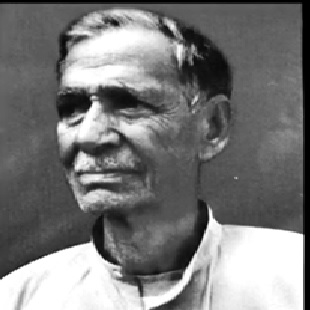 On 24 April 1917, Umesh Chandra Dev Choudhury was born and raised in the region of Patacharkuchi. After finishing his education at the Bajali Higher Secondary School, Umesh Chandra moved to Manipur to work as a doctor with his older brother, Dr. Homeswar Dev Choudhury. Later, Umesh Chandra traveled to Rajshahi in East Bengal (Undivided India), where he had the chance to interact with several well-known political figures.
On 24 April 1917, Umesh Chandra Dev Choudhury was born and raised in the region of Patacharkuchi. After finishing his education at the Bajali Higher Secondary School, Umesh Chandra moved to Manipur to work as a doctor with his older brother, Dr. Homeswar Dev Choudhury. Later, Umesh Chandra traveled to Rajshahi in East Bengal (Undivided India), where he had the chance to interact with several well-known political figures.
Umesh Chandra had a good relationship with Netaji Subhas Chandra Bose as an Indian National Army (INA) soldier. He served in the British Army for a brief period in 1941 before enlisting in the INA on 15 February 1942. Umesh Chandra Dev Choudhury was raised to the rank of Lieutenant and engaged in combat with the British in 1943 when Netaji assumed control of the INA. When the British captured him in 1945, he was imprisoned in Delhi's Red Fort before being moved to the Multan Jail.
Lieutenant Umesh Chandra Dev Choudhury, a member of the Indian National Army (INA) to have served in Assam, passed away at his home in Patacharkuchi in the Barpeta district. The community was saddened by this grave loss to the nation.
Rauta Ram Koch
Rauta Ram Koch was born in Bar Saderi village of the present Bajali District of Assam on 12 April 1914. The name of his father was Kehoram Koch and his mother was Habe Bala Koch. The name of his wife was Gathuri Priya Koch. He was a peasant. Like other parts of India, the people of the Bajali district of Assam joined the Quit India movement with full enthusiasm. They joined in processions, meetings, hunger strikes, etc. against the British government. On 25 September 1942, to protest against the death of Bhogeswari Phukanani, Thogiram Sut, Baloram Sut, and Lakshminath Hazarika in the movement in the Nagaon District of Assam, the people of Bajali district met in three Raij Mels. The police force was forced to dismiss the meeting and arrested the president of the meeting Girish Chandra Chaudhury and some others. After the incident, immediately the people of Badan Kuchi, Saderi, Kalarguri, Bhogpur, Dakhala, Bamakhata, etc. emerged against the British. The British brought the arrested people to Patachar Kuchi Police Station. Under the leadership of Srikanta Basumatary, the people blocked the British force at Rihabari village. Then the Daroga Tularam Keot ordered Salmat Ali (the British police) to fire upon them. In the incident, Rauta Ram Koch was martyred on spot on 25 September at the age of 29. His wife Gathuri Priya Koch received a family freedom fighter pension. He had a daughter. His two grandsons received government jobs as a member of the Swahid family.
Narakanta Das
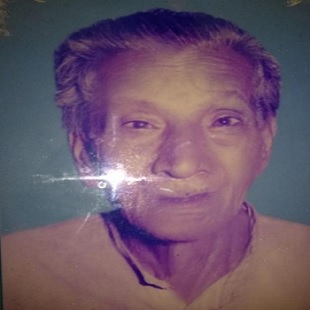 Narakanta Das was born in January 1911. The name of his father was Pesa Ram Das and his wife was Sarada Das. He had four sons. He was a teacher at Bajali High School. Like other parts of India, the people of the present Bajali district of Assam joined the Quit India movement with full enthusiasm. They joined in processions, meetings, hunger strikes, etc. against the British government. To protest against the death of Bhogeswari Phukanani, Thogiram Sut, Baloram Sut, and Lakshminath Hazarika in the movement in Nagaon District of Assam, the people of Bajali district met in three Raij Mels. The presidents of the Raij-Mels were gaonburha, doloi and prominent persons of the village. In each meeting, one of them became president of the meeting. He was the president of one Raij-Mel held to protest against the incident in Nagaon. The British tried to arrest him but he fled and escaped for months. He even resigned from his job to join the freedom movement. His associates were Homeswar Choudhury, Girish Choudhury, Keshab Lal Das, Gauri Kanta Sharma, Ram Nath Sharma, etc. Freedom fighter pension was allowed in his name but he had denied to take it saying that, for the work he had done for his motherland, he did not need any recognition. In January 1996 at the age of 85, he passed away.
Narakanta Das was born in January 1911. The name of his father was Pesa Ram Das and his wife was Sarada Das. He had four sons. He was a teacher at Bajali High School. Like other parts of India, the people of the present Bajali district of Assam joined the Quit India movement with full enthusiasm. They joined in processions, meetings, hunger strikes, etc. against the British government. To protest against the death of Bhogeswari Phukanani, Thogiram Sut, Baloram Sut, and Lakshminath Hazarika in the movement in Nagaon District of Assam, the people of Bajali district met in three Raij Mels. The presidents of the Raij-Mels were gaonburha, doloi and prominent persons of the village. In each meeting, one of them became president of the meeting. He was the president of one Raij-Mel held to protest against the incident in Nagaon. The British tried to arrest him but he fled and escaped for months. He even resigned from his job to join the freedom movement. His associates were Homeswar Choudhury, Girish Choudhury, Keshab Lal Das, Gauri Kanta Sharma, Ram Nath Sharma, etc. Freedom fighter pension was allowed in his name but he had denied to take it saying that, for the work he had done for his motherland, he did not need any recognition. In January 1996 at the age of 85, he passed away.
Akshay Kumar Das
Akshay Kumar Das was an idealistic Gandhian leader. He was popularly known as Akshay Babu. He was born on 18 March 1899. His father Manhari Das was a devotee of Satriya art and culture, and her mother Vrindavali Das was an ideal mother. Akshay Kumar Das was a brilliant student from an early age. He passed the matriculation examination in 1918 in the first division from the Barpeta Government High School. He took a B.A. degree with English Honors in 1921 from Cotton College. After completing his M.A. in English from the Presidency College, Calcutta, he took admission at Ripon College to study law. But under the leadership of Mahatma Gandhi, the whole of India became a jury. Therefore, he returned to Assam and participated in the independence movement.
Later, in 1927 Akshay Babu completed his degree and started practicing law in Barpeta in 1928. But in 1930, he boycotted practicing advocacy for the call of Mahatma Gandhi and actively participated in the independence movement. During that time, he became a member of Congress and led the Barpeta district at various stages of the freedom struggle. He was convicted of hoisting the National Flag on 26 January on the premises of the Barpeta Kirtanghar and sentenced to six months’ rigorous imprisonment. However, he was released along with other political prisoners under the 1931 Gandhi-Erwin Pact. He held various positions in the Barpeta Congress Committee and became a member of the Executive Committee of the Assam Congress Committee.
Due to his quality and dedication to the great cause, he was elected as State Vice-Chairman also. In 1945, he became the President of the Local Board for the first time as a Congress candidate. At that time, he was also the Chairman of the school board. After the independence of the country, in 1952 and 1962, he was twice re-elected to the Assam Legislative Assembly from the Sorbhog constituency as a candidate of the Congress party.
He was a saint in his political and personal life. Akshay Babu's life was very simple and frugal. His role in the social life of Barpeta was immense. He fought for the rights of Harijans, and their entry into the Kirtanghar. In 1969, he became the Acting President of the Reception Committee of the 36th Barpeta Session of the Assam Sahitya Sabha. The session was successfully conducted. He was involved in various social activities such as the establishment of schools like Gopinath Bardalai High School, Barpeta Road, Howley High School, Chhayaram Girls' Educational Institution, Barpeta Vidyapeeth and the Tarunram Phukan Hall, etc.
Until 1958, there was no other mode of transport from Barpeta to Guwahati except by rail. As a member of the Assam Legislative Assembly, Akshay Kumar Das took initiative to construct the PWD road from Barpeta to Hajo to Guwahati, which is presently known as the State Highway. Akshay Kumar Das was the driving force behind the introduction of telephone services and electricity in Barpeta. Born in the Sutradhara dynasty, Akshay Kumar Das was closely associated with Sankari Art and Culture. He could sing Borgeet in a melodious tone.
He passed away in the year 1941, leaving behind two daughters and a son.
Basanta Kumar Ojah
Basanta Kumar Ojah was one of the selfless activists who participated in the Indian freedom movement. He was born in Dalahati, Barpeta. His participation began during his school days. In 1921, the Non-Cooperation Movement started under the leadership of Mahatma Gandhi throughout the country. At that time, Basanta Ojah left school and joined the movement. At that time, Umesh Chandra Brahmachari was the President of the Barpeta Subdivision Congress and Dhaniram Talukdar was the Secretary. Tarun Ram Phukan, Nabin Chandra Bardalai, Rohini Chowdhury, and others were present in front of the Barpeta Kirtanghar in a protest meeting. Ojah played an active role in this protest.
The Shankar Hall at Barpeta Mazarhati was the Congress office. During this time the British government declared the volunteer force illegal. Ojah, along with other volunteers, was sentenced to one-month imprisonment and fined Rs. 20. He was released after completion of the sentence. Thereafter, he was appointed as the Secretary of the Sub-Divisional Congress Committee. He had to face inhuman torture by the British police, although his mind and heart were not stirred. Ojah was again sent to jail. He was sentenced to three months imprisonment this time and fined Rs 20.
In 1936, a session of the General Assembly of the Indian National Congress was held at Pandu, Guwahati, which was attended by Mahatma Gandhi. Ojah was appointed as the head of the exhibition sub-committee and the volunteer force. The exhibition organized therein was so interesting that it was highly appreciated by all the spectators and delegates. Ojah was delighted to be included in the Assam delegation to the Gaya Sessions in 1922, the Calcutta Sessions in 1926, the Lahore Sessions in 1929, and the Karachi (now a port city of Pakistan) in 1931. In 1929, a session of the National Congress Committee, chaired by Jawaharlal Nehru, was held in Lahore (now Pakistan) and a proposal for complete independence was adopted and January 26 was observed as Independence Day. The first Independence Day was celebrated on 26 January 1930. Ojah came to Barpeta to observe the first Independence Day. Promod Sen was the SDO Civil of Barpeta subdivision at that time. After this the freedom fighter went to Baranagar for mass mobilization. But the British police followed him and searched his house and seized some papers related to the freedom movement. On that allegation, he was again arrested and sent to jail. This time he had to spend six months in Guwahati jail and was fined Rs. 200. During this time, Assam Keshari Ambikagiri Raychowdhury was also imprisoned, along with about 150 standard volunteers. After completion of the jail term, he came back to Barpeta. He was warmly welcomed by a huge procession. Born in 1896, this great freedom fighter passed away on 25 May 1975.
Devendra Nath Uzair
Devendra Nath Uzair was one of the leading freedom fighters, a devoted social worker, orator, talented actor, and good player. He was born on 2 November 1897 in the village of Kardaiguri near Sarupeta. His father Abhay Charan Uzir was the son of Mihira Uzir, the Mouzadar (Landlord) of Baksa. Devendra Nath Uzair began his education in Barpeta and matriculated from the Barpeta Government High School in the year 1919. He graduated from Rajmahi College, now in Bangladesh with a degree in Law from Earl Law College in 1914. He started practicing law in the District Court at Guwahati. His colleagues at that time were Tarun Ram Phukan, Naveen Chandra Bardalai, Md. Taibullah, Tirthanath Phukan, and Hemant Lahiri, among others. He was offered the post of Magistrate by the British government. But he refused it the call of Mahatma Gandhi and Motherland and joined the struggle for Indian independence.
In 1934, Mahatma Gandhi visited Barpeta and he was warmly received by Devendra Nath Uzair as the President of the District Congress. In 1936, the latter was the Deputy Chairman of the Assam Pradesh Congress Committee. Barpeta Chayaram National High School was established with his active support. He was a well-known actor as well. He was the key parson to form the 'Ukil Party', an armature drama troupe comprising of highly educated lawyers in the year 1918. They established the present 'Milon Mandir Natya Samaj' in the year 1931. The role of Devendra Nath Uzair in this regard is noteworthy.
Devendra Nath Uzair was acclaimed by the audience for his performances in various roles in the non-fiction plays of Milon Mandir Natya Samaj. He is best known for his role as Nilambar in the play 'Hochen Shah' and for his role of 'Yashovand Singh' in the play ‘Shahjahan'. His acting passion stunned the audience, especially in his role as Sankha Banik in the year 1969 in the play titled 'Beula' at the age of about 80 years. He also excelled as a cricketer and football player. As a student, he represented the Earl's College football team and was honored as the best player in Calcutta. He was a polite, courteous, and determined gentleman. The Gandhian leader passed away on 16 December 1983 at his residence in Amolapatti.
Ganesh Lal Chowdhury
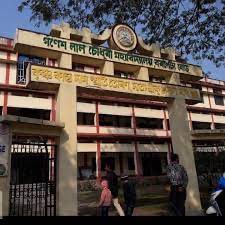 Ganesh Lal Chowdhury was an actor, poet, lyricist, eloquent, and politician. He was born in the year 1896. His father's name was Shyamlal Chowdhury and his mother's name was Pramila Chowdhury. Shyamlal Chowdhury’s native home was at Barpeta town Dahati, although he worked for some time as a government servant in Palashbari. While working in Palashbari, his third child, Ganeshlal Chowdhury was born. When Ganeshlal Chowdhury was reading in the Xth standard, his father passed away. After the demise of his father, he joined the Congress party and participated in the freedom movement. He was imprisoned in the year 1921 for participating in the independence movement. He came out of prison with a very serious illness.
Ganesh Lal Chowdhury was an actor, poet, lyricist, eloquent, and politician. He was born in the year 1896. His father's name was Shyamlal Chowdhury and his mother's name was Pramila Chowdhury. Shyamlal Chowdhury’s native home was at Barpeta town Dahati, although he worked for some time as a government servant in Palashbari. While working in Palashbari, his third child, Ganeshlal Chowdhury was born. When Ganeshlal Chowdhury was reading in the Xth standard, his father passed away. After the demise of his father, he joined the Congress party and participated in the freedom movement. He was imprisoned in the year 1921 for participating in the independence movement. He came out of prison with a very serious illness.
Ganesh Lal Chowdhury was also known as a successful lyricist. The songs published in the 'Bahi' magazine generally expressed the sentiments and ideals of the freedom movement and patriotism. On Sankardeva's birth anniversary held at Sankara Hall in Barpeta, he composed a song titled ‘Ami Milisho Tirthagami’ which was very popular at that time. Ganesh Lal Chowdhury, one of the founders of the famous Milan Mandir Natya Samaj, was himself one of the main actors. He played the lead role in almost all the plays performed at Milon Mandir. His performances in ‘Shahjahan’ and ‘Mewar Patan’, among others were memorable.
We lost this great person prematurely due to pleurisy in 1931 at the age of only 35 years.
Janardan Das
Janardan Das was the son of the late Ganga Mahajan, a prominent businessman of Ambarihati, Barpeta town. Ganga Mahajan living in Barpeta Barhati was a descendant of Kajla Maji, a close disciple of the great Srimanta Sankardeva. Ganga Mahajan had three sons - Narayan (Gakul), Janardan, and Ramesh, respectively. All his family members took part in the Indian Independence Movement. Janardan Das was born in the year 1877. Janardhan Das went to Kolkata and joined a circus company. Later in the established a circus party. But due to a natural disaster, the party was dissolved. Then he returned to Barpeta and started a printing press.
The non-cooperation movement was gaining momentum. Gandhiji's 'Swaraj in one year' was a roar against the British. As a result, during the Non-Cooperation Movement of 1921, many freedom fighters from all over Assam who fought against the British were imprisoned. Janardan Das was also sent to Guwahati jail for a duration of about one year. Later, he became the General Secretary of the Barpeta Congress Committee.
Dhaniram Talukder
Dhaniram Talukder was a pioneer in the freedom movement in the Barpeta district. He was born on 2 October 1888 at Chenga Village of the district. He was involved in social work such as the abolition of untouchability, abolition of drugs, abolition of foreign clothes, etc. He preached the message of the independence movement in various villages of the Barpeta subdivision. He was accompanied by Umesh Chandra Brahmachari, Giridhari Das, Amrit Das, Ramnath Sharma, Rajendra Chowdhury, Basanta Ojha, and Guru Prasad Das, Jagannath Das, Haliram Mahanta.
Despite many hurdles, such as floods, hailstorms, etc., he reached all corners of the district and convinced the villagers in favour of the mantras of Mahatma Gandhi, and preached the message of independence. This is how he became physically ill. When Mahatma Gandhi came to Guwahati, the patriotic Tarun Ram Phukan allowed Dhaniram Talukder to sit with Gandhiji and exchange his words in Hindi and English. Naveen Chandra Bardalai introduced Dhaniram Talukder to Mahatma Gandhi and said, ‘This young advocate is the leading activist of Assam’. After hearing this, the Mahatma thanked and blessed him.
Talukder started practicing law in Barpeta in the year 1921. He was imprisoned for 15 months for joining the independence movement. He was transferred from Guwahati Jail to Tezpur Jail. He was accompanied by some freedom fighters like Deben Wazir, Gaurikant Talukdar, Rohini Kumar Chowdhury, Hari Prasad Brahmachari, Mohammad Tayabullah, etc. at the jail. They were handcuffed and taken to the port of Ujan Bazar. He was compelled to work in jail as per the rules of the colonial regime. In the name of food, they were given half-cooked low-quality rice and black lentils, etc. In addition, they were severely punished. Two months later, he gave them a special class. This is how they spent their lives in prison. Hariprasad, Golag Goswami of Golaghat, and Dhaniram Talukdar remained in jail till the end.
On 3 April 1923, Dhaniram Talukder was released from prison. His physical and mental strength was intact. He did a lot of constructive work during his tenure as the Secretary of the District Congress. Later, Talukder became the President of the Barpeta district and Janardan Das became the Secretary, due to the physical illness of Umesh Chandra Brahmachari, the earlier President. He has a full-fledged family with several sons and daughters. All were highly educated. Freedom fighter Dhaniram Talukdar's family is a well-known family in Barpeta town. He was also the Chairman of the Barpeta Local Board for one year. He was instrumental in introducing the Assamese language among the Muslims of the Barpeta subdivision. He established Assamese Schools in remote areas of the district. He was one of the founders of Barpeta Vidyapeeth. In 1974, he was elected to the Assam Legislative Assembly from the Barpeta Assembly constituency.
Dhaniram Talukder passed away on 25 January 1982 at the age of 84 years in Barpeta.
Mahendra Mohan Choudhury
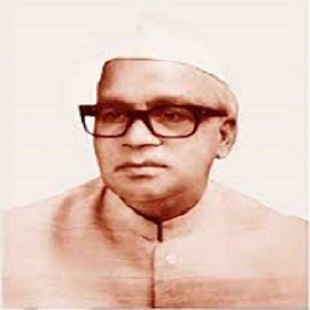 Mahendra Mohan Choudhury was a freedom fighter and politician from Nagaon, the undivided Kamrup district (now Barpeta district) of Western Assam. He was the Chief Minister of Assam from 1970-1972. He also served as the Governor of Punjab.
Mahendra Mohan Choudhury was a freedom fighter and politician from Nagaon, the undivided Kamrup district (now Barpeta district) of Western Assam. He was the Chief Minister of Assam from 1970-1972. He also served as the Governor of Punjab.
Mahendra Mohan Choudhury was born on 12 April 1908. He did his graduation in Arts and subsequently completed his Bachelor of Laws. A great persona and a true Gandhian, he fought for the independence of India during the freedom movement and went to jail thrice in 1932, 1941, and 1945, respectively. He was a member of Assam Vidhan Sabha (1946-1952), Parliamentary Secretary (1947), State Minister (1951, 1955), President of Assam Congress Committee, President of Assam Vidhan Sabha (1967), Speaker of the Assam Legislative Assembly (1959-1967), Cabinet Minister (1967–1970), Chief Minister of Assam (1970–1972) and Governor of Punjab.
He wrote books, viz. Mahatma Gandhi and the Philosophy of Binova Bhabe. He was associated with many socio-religious institutions like Sankardev-Kristi Vikash Samiti, Gita Samaj, Madhupur Satra, etc. Mahendra Mohan Choudhury was also instrumental in founding the Saint Sankaradeva Chair at the Punjabi University, Patiala, Punjab, which has contributed immensely to acquainting the pan-Indian community of scholars with the Life and Works of the Saint.
Mahendra Mohan Choudhury died in Guwahati Medical College and Hospital following a heart attack on 27 December 1982.
Ambikagiri Raichoudhury
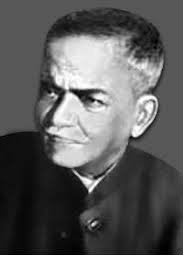 Ambikagiri Raichoudhury was an Assamese poet, lyricist, singer, powerful prose writer, news worker, magazine editor, patriotic, social worker, and the leading freedom fighter of India's freedom struggle. He is known as 'Assam Kesari'. He was elected President of the Assam Sahitya Sabha in 1950. Raichoudhory was born in 1885 in the famous Raichoudhury family of Barpeta. His father was Krishnaram Raichoudhury and his mother was Devika Devi. After his primary education in Barpeta, he studied in class VIII of high school in Guwahati. Then he joined the Swadeshi Movement and social development work from 1904-05. He joined a few other youth students and formed a British Opposition Anarchist team during this period. As a result, the British government captured Ambikagiri in Barpeta from 1908-1915.
Ambikagiri Raichoudhury was an Assamese poet, lyricist, singer, powerful prose writer, news worker, magazine editor, patriotic, social worker, and the leading freedom fighter of India's freedom struggle. He is known as 'Assam Kesari'. He was elected President of the Assam Sahitya Sabha in 1950. Raichoudhory was born in 1885 in the famous Raichoudhury family of Barpeta. His father was Krishnaram Raichoudhury and his mother was Devika Devi. After his primary education in Barpeta, he studied in class VIII of high school in Guwahati. Then he joined the Swadeshi Movement and social development work from 1904-05. He joined a few other youth students and formed a British Opposition Anarchist team during this period. As a result, the British government captured Ambikagiri in Barpeta from 1908-1915.
Raichoudhury was a poet, playwright, and patriot all rolled in one. He took part in the Independence Movement for India and was imprisoned by the British for the same. He was the founder of ‘Asom Songrokhini Sobhaa’ (Assam Preservation Council) and ‘Axom Jaatiyo Mohasobhaa’. During his time in Barpeta, Raichoudhury avoided political activities and looked at the social life of the area, and got engaged in some social organization and literary-cultural activities. Among them was the collection of funds to facilitate the reading of poor students, the ‘Sankardeva Sarcharkas’ organization, encouraging people to talk Assamese folk songs, etc. He also took a great effort to erase the effects of Bengali Yatra Naat from the social life of Barpeta.
In 1915, Raichoudhury went to Dibrugarh and worked as a typist for the Railway Department, music teacher, etc. as well as the literary editor of the literary magazine Assam Bandhva with Harekrishna Das. In the days that followed, most of his social and political thinking was published as an editorial in the Chetanaa that he himself had published. During his days in prison in the Non-Cooperation Movement, he composed songs about the struggle for freedom such as those ones that greatly instilled support for other freedom fighters. Raichoudhury was jailed again in the 1930 movement. He became a very patriotic follower of Mahatma Gandhi.
For the protection of the future of Assam and Assamese, Raichoudhury established ‘Assamese Rights and Interests Conservation Meeting’, ‘Assam Jatiya Mahasabha’, and ‘Assam Shiksha Prachar Samiti’ to protect the dignity of Assamese in view of the encroachment of infiltrators on the farmland of the state. Raichoudhury himself took care to show Assamese society the path of self-establishment economically by opening the ‘Swadeshi Kinok Sangha’ and establishing a business company called ‘Mayabini Chemical Works’. He also published books like 'Deka-Dekarir Veda', 'Ahuti' to reveal his doctrine to the people. In 1946-47, during the fear of including Assam to Pakistan, 'Assam Self-Defense Force' was created by Assamese Hindu-Muslim united efforts, protesting against the formation of constituencies and declared a resolution to go on hunger strike.
Raichoudhury published several poetry books. He also wrote a patriotic drama named Bandini Bharat, the script of which was intercepted by British Police in 1906. After which Raichoudhary was put under police vigilance for about 8 years until 1915. During the 1921 Non-Cooperation Movement, he composed many nationalist songs while in jail. This English translation was revealed back as 'Songs of the Cell'. His nationalist poems have a sharp protest against the atrocities and there are great calls to go ahead with the battle of life. The poet wishes for a life in which human beings can develop by putting away all the hypocrisy and lowness. He was also the editor of ‘Dekaa Asom’, an Assamese magazine. In 1965, he won the Sahitya Akademi Award. The 'Ambikagiri Raichaudhuri Award' presented by Assam Sahitya Sabha is named after him. Assam Kesari Ambikagiri died on 2 January 1967 at the age of 82 years.
Chandraprabha Saikiani
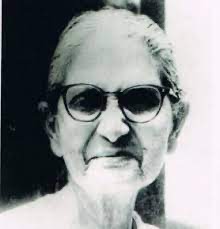 Chandraprava Saikiani was an Assamese freedom fighter, activist, writer, and social reformer who is considered to be the pioneer of the feminist movement in Assam. She was the founder of the All Assam Pradeshik Mahila Samiti, a non-governmental organization working towards the welfare of the women of Assam, and was a recipient of the fourth highest Indian civilian award of Padma Shri for the year 1972 from the Government of India. Three decades later, the Indian government issued a commemorative stamp on Saikiani under the series, Social Reformers, in 2002. She also took a proactive role in the Civil Disobedience Movement of 1932 and the Non-Cooperation Movement of 1920- 21. Contesting elections for the Legislative Assembly, she became the first woman to foray into politics in Independent India. Saikiani was also a noted poet and prolific writer.
Chandraprava Saikiani was an Assamese freedom fighter, activist, writer, and social reformer who is considered to be the pioneer of the feminist movement in Assam. She was the founder of the All Assam Pradeshik Mahila Samiti, a non-governmental organization working towards the welfare of the women of Assam, and was a recipient of the fourth highest Indian civilian award of Padma Shri for the year 1972 from the Government of India. Three decades later, the Indian government issued a commemorative stamp on Saikiani under the series, Social Reformers, in 2002. She also took a proactive role in the Civil Disobedience Movement of 1932 and the Non-Cooperation Movement of 1920- 21. Contesting elections for the Legislative Assembly, she became the first woman to foray into politics in Independent India. Saikiani was also a noted poet and prolific writer.
She was born as ‘Chandrapriya Mazumdar’ (Chandrapriya Das) on 16 March 1901 to Ratiram Mazumdar (a village headman) and Gangapriya Mazumdar at Doisingari village of the then Kamrup district in the Northeast Indian state of Assam. She was the seventh of eleven children and choose the name ‘Chandraprabha Saikiani’ for herself. Accompanied by her sister Rajaniprabha Saikiani (who later became the first woman doctor of Assam), they waded through waist-deep mud to attend a boys' school (there was no girls' school) that lay several kilometers away. Their endeavour impressed Nilkanta Barua, a school sub-inspector, and she was awarded a scholarship to the Nagao Mission School. At the Nagao Mission School, she protested against the school authorities who did not allow one of the girls to stay at the hostel after her rejecting to convert to Christianity. She finally saw the result of her protest that the authorities admitted the girl into the hostel. After school, she gathered the local illiterate girls and taught them what she learned at school at a makeshift shed near the school. Her social activism started here when she protested against the allegedly discriminatory treatment meted out to Hindu students by the hostel superintendent.
She refused to honour her parents' commitment to marrying her off to an elderly person and got engaged to Dandinath Kalita, an Assamese writer. Later, she was reported to have faced strong opposition from the conservative society in bringing up her son as a single mother but her life in Tezpur brought her opportunities to meet and interact with social and cultural leaders such as Chandranath Sharma, Omeo Kumar Das, Jyotiprasad Agarwalla and Lakhidhar Sarma.
Saikiani started her career as a teacher at a primary school in Nagaon and later, became the headmistress of the Girls’ M. E. School, Tezpur. During her stay at Tezpur, she associated herself with luminaries like Jyotiprasad Agarwala, Omeo Kumar Das, Chandra Nath Sarma, and Lakhidhar Sarma. In 1918, at the Tezpur session of Asom Chhatra Sanmilan, she was the only female delegate who addressed a huge gathering on the harmful effects of opium consumption and asked for its ban. It was the first event where an Assamese woman spoke in front of a large gathering.
Impressed by the rise of nationalism in 1921, she joined the Non-Cooperation Movement of Mahatma Gandhi and worked to spread the message among the women of Tezpur. She was an invited speaker at the Nagaon session of the Assam Sahitya Sabha in 1925 where she called upon the women attendees who were seated in a separate enclosure to break the barriers and the women heeded her call to come out to the open area. Returning to her village, she joined Kaljirapara School as a teacher but resigned her job when she was denied permission to attend the Guwahati session of the Indian National Congress. She continued her social activism and founded the Assam Pradeshik Mahila Samiti in 1926 to act against child marriage, polygamy, and the discrimination of women at the temples and to take up women-centric issues such as their education and self-employment. Her efforts were reported in getting the Hayagriv Madhava Temple, Hajo, near Guwahati open its gates for women. Her involvement with the Civil Disobedience Movement landed her in jail in 1930 and later in 1943, she was jailed again while participating in the Non-Cooperation Movement.
Chandraprabha Saikiani was a noted poet and a prolific writer. She also published a novel titled Pitribhita in 1937. The Government of India honoured her with Padmashree in 1972 shortly after her death. She served as the editor of Mahila Samiti's Assamese journal Abhijatri for a period of seven years, and also headed the All India Assam Peasants' Conference.
Saikiani died on her 72nd birthday, i.e., on 16 March 1972 succumbing to cancer. The government polytechnic in Kamrup, Guwahati is named after her, and Tezpur University established a women's centre in her name - Chandraprabha Saikiani Center for Women’s Studies (CSCWS) in 2009 for promoting women's education in Northeast India.
The Martyrs - Rauta Koch and Madan Barman
After the death of Kanaklata Barua and Mukunda Kakati during the police firing in Gahpur in 1942, on 25 September, four public meetings were held in the Bajali area on the observation of ‘Protest Day’. The main objectives of these meetings were to protest the police violence imposed by the British. The four places in the Bajali area where public meetings were held were - Jalah, Nityananda, Soukhuti, and Bamunkuehi. From the four places, the police already reached Jalah, Nityananda, and Soukhuti before the beginning of the meeting.
The meeting of Jalah, Nityananda and Choukhuti was presided by Girish Ch. Choudhury, Bharat Chandra Goswami, and Narkanta Das, respectively. When the meeting started at the Daroga of Patacharkuehi Police Station, Tularam Keot reached with police and military force at the meeting place and they arrested Girish Ch. Choudhury, Rajani Kanta Sarma, and Bhadreswar Das from the meeting venue. The crowd protested against the police action. The police force began firing at the crowd. Many people were injured and Madan Barman, a school student of Class-VI and resident of Bhogpur, and Rauta Ram Koch of Saderi succumbed to bullet injury.
In this ‘Rehabari incident’ where Madan and Rauta lost their lives to bullets, many innocent people were also tortured by the police. The ‘Rehabari Incident’ became an inspiration for the people of not only Bajali but also the people of the entire state.
Source :
- Indian Culture Portal
- Chakreswar Deka, Contributor for CCRT
- Kabita Adhikari, Contributor for CCRT
- Achyut Chandra Das, Age: 60, Village: Bar Saderi, Bajali
- Arup Das. (great-grandson) Age: 38, Village: Bamakhata
- District Information & Public Relations Officer, Barpeta
- Azadi Ka Amrit Mahotsav
Last Modified : 8/11/2023
Process to apply for Driving License in Barpeta di...
This topic Provides information about Personalitie...
This topic provides information about Events that ...
Provides information related to People and Person...
